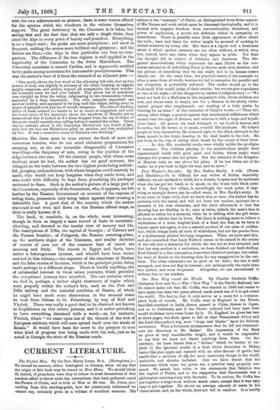CURRENT LITERATURE.
The Perfect Man. By the Rev. Harry Jones, M.A. (Rivingtons.)-- We intend no censure, either theological or literary, when we say that the origin of this book may be traced to Ecce Homo. We should think ill, indeed, of preachers, were they to refuse to avail themselves of that resolute effort to throw aside the conventions that have gathered round the Person of Christ, and to look at Him as He was. Mr. Jones, pro- ceeding from this starting-point, how far consciously influenced we cannot say, certainly gives us a volume of excellent sermons. His subject is the "example " of Christ, as distinguished from those aspects of His Nature and work which must be discussed theologically, and it is treated with singular freedom from conventionality, directness, and power of application, a power not deficient either in sympathy or shrewdness. There is possibly some little appearance of effort about the style ; here and there the writer might be accused of seeking to attract attention by being odd. But there is a vigour and a freshness about it which spoken sermons are too often without, to which very few, indeed, have any claim when they appear in print. Nor does the thought fail in respect of boldness and clearness. The dis- guised monothelitism which represents the man Christ as the con- scious automaton of indwelling Deity is thrown aside with decision, and the picture of something that we can really feel to be human comes clearly out. At the same time, the practical lesson of the example, 13e often a mere form of words, because we fail to recognize the parallel and the obligation, is powerfully enforced. The reader should go to the book itself, if he would judge of their merits; but we can give a specimen or two of his style,—of the disappointing nature of religions duty :—" We must not look for a Madonna in the carpenter's wife, whose children are sick, and whose store is empty, nor for a Simeon in the shaky white- haired pauper who supplements our reading of a holy psalm by whining for an alms ;" of the character of Christ's works :—" They are,. among other things, a protest against that sentimental selfishness which cannot bear the sight of distress, and relieves it with a huge and injudi- cious hand. All power, we read, belonged to our Lord in heaven and in earth; but He never, so to speak, overdid His kindness. He helped people to help themselves, He restored sight to the blind, strength to the lame, speech to the dumb, hearing to the deaf, health to the sick. He put them in the way of eating their bread by the sweat of their brow.
In this His wonderful works were wholly unlike the prodigies of romance. The children playing in the market-place people their supernatural world with good genii and fairies, whose magic wand changes the peasant into the prince. But the miracles of the Kingdom of Heaven raise no one above his place. If he has fallen out of the ranks, he is put back to fight his way, and no more."






























 Previous page
Previous page